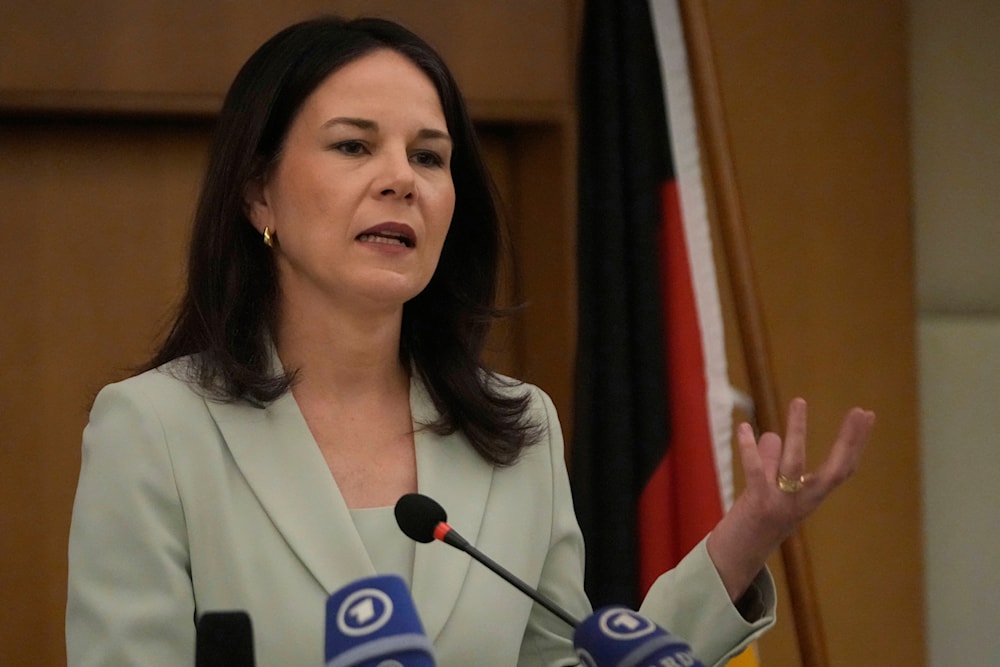Germany reopens its embassy in Syria after 13-year closure
German Foreign Minister Annalena Baerbock officially reopened Germany's embassy in Damascus on Thursday, marking the end of a 13-year closure.
-
 Germany's Foreign Minister Annalena Baerbock speaks during a press conference, in Beirut, Lebanon, on March 19, 2025 (AP)
Germany's Foreign Minister Annalena Baerbock speaks during a press conference, in Beirut, Lebanon, on March 19, 2025 (AP)
German Foreign Minister Annalena Baerbock reopened her country's embassy in the Syrian capital Damascus on Thursday after a 13-year closure.
"Minister Baerbock officially reopened Berlin's embassy in Damascus," German special envoy to Syria, Stefan Schneck, said on X.
"We are pleased to work closely with all Syrians for a better Syria," he added.
أعادت الوزيرة بيربوك اليوم افتتاح السفارة الألمانية في #سوريا رسميًا. يسعدنا العمل عن كثب مع جميع السوريين من أجل سوريا أفضل. للأسف، لا يزال فريقنا صغيرًا، لذا ستبقى شؤون التأشيرات والقنصليات تُدار من بيروت للفترة المقبلة. pic.twitter.com/H3PzGkbz2A
— Stefan Schneck (@GERonSyria) March 20, 2025
The envoy said the working team in the embassy is “still small".
“The visa and consular affairs will remain managed from Beirut for the coming period," he added.
Germany urges Syrian interim leaders to control extremist groups
Following talks in Damascus with interim president Ahmad al-Sharaa and other officials, German Foreign Minister Annalena Baerbock said that they must bring under control and hold accountable groups behind sectarian massacres committed this month, which killed more than 1,500 lives, predominantly from the minority Alawite community, on Syria's Mediterranean coast.
The new Syrian security forces and their allied groups have been accused of committing the massacres, in the worst wave of violence since the overthrow of Bashar al-Assad's regime.
"It is imperative that extremist groups in their ranks are brought under control and those responsible for crimes are held accountable," she said
"Any attempt at renewed escalation must be prevented."
Baerbock described the situation in Syria as "particularly volatile" and said the country was "on a knife edge" as it seeks stability after years of war.
She said numerous actors inside and outside the country were trying "to torpedo this peaceful political process."
"As Europeans, we will not support a resurgence of Islamist structures, the top German diplomat asserted.
She called for a power-sharing system where all groups, including Druze, Alawites, Christians, and others, "also feel part of a new, shared Syria".
The participation of women would be "a key indicator of this, as they make up 50 percent of the population," she added.
"Our common goal is that Syria never falls back into civil war."
Baerbock said badly needed private investment for the war-battered country "will only come when a stable, functioning state guarantees that there will never be violence and chaos again, and that people will never have to flee again."
On Monday, Germany pledged millions of dollars in aid to Syrians in their country, as well as refugees and their host countries, through the United Nations and other international organizations.
Berlin pledged 300 million Euros (326 million dollars) before the EU-led donor conference in Belgium, noting that more than half of the funds will be aimed towards the people in Syria, and will be implemented without the transitional government.
Syrian refugees and host communities in Jordan, Lebanon, Iraq, and Turkiye will also receive the support, which includes food, health services, emergency shelters, and protective measures for the particularly vulnerable, according to the Foreign Ministry.
"As Europeans, we stand together for the people of Syria, for a free and peaceful Syria," Baerbock said, repeating the importance of an inclusive political process to guarantee a peaceful future for Syria while calling for the transitional government to investigate the killing of thousands of civilians in Alawite villages and hold those responsible accountable.
Read next: Germany explores large-scale return of Syrian refugees

 4 Min Read
4 Min Read








